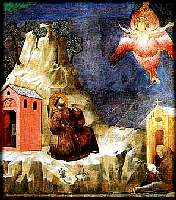The stigmatization of Saint Francis of Assisi
 |
|
Saint Francis of Assisi recieves the stigmata during a 40-days fast before the feast of SaintMichael the Archangel on mount la Verna 1224. |
Cponcerning the vision of the man in the likeness of a crucified seraph.
(From Thomas of Celano, Vita Prima, nn.94-96)
"94 Two years before Francis gave his soul back to heaven, while he was living in the hermitage which was called Alverna, after the place on which it stood, he saw in the vision of God a man standing above him, like a seraph with six wings, his hands extended and his feet joined together and fixed to a cross. Two of the wings were extended above his head, two were extended as if for flight, and two were wrapped around the whole body.
When the blessed servant of the Most High saw these things, he was filled with the greatest wonder, but he could not understand what this vision should mean. Still, he was filled with happiness and he rejoiced very greatly because of the kind and gracious look with which he saw himself regarded by the seraph, whose beauty was beyond estimation; but the fact that the seraph was fixed to a cross and the sharpness of his suffering filled Francis with fear. And so he arose, if I may so speak, sorrowful and joyful, and joy and grief were in him alternately. Solicitously he thought what this vision could mean, and his soul was in great anxiety to find its meaning. And while he was thus unable to come to any understanding of it and the strangeness of the vision perplexed his heart, the marks of the nails began to appear in his hands and feet, just as he had seen them a little before in the crucified man above him.
His hands and feet seemed to be pierced through the middle by nails, with the heads of the nails appearing in the inner side of the hands and on the upper sides of the feet and their pointed ends on the opposite sides The marks in the hands were round on the inner side, but on the outer side they were elongated; and some small pieces of flesh took on the appearance of the ends of the nails, bent and driven back and rising above the rest of the flesh. In the same way the marks of the nails were impressed upon the feet and raised in a similar way above the rest of the flesh. Furthermore, his right side was as though it had been pierced by a lance and had a wound in it that frequently bled so that his tunic and trousers were very often covered with his sacred blood. Alas, how few indeed merited to see the wound in his side while this crucified servant of the crucified lord lived! But happy was Elias who, while the saint lived, merited to see this wound; and no less happy was Rufino who touched the wound with his own hands. For when this Brother Rufino once put his hand upon the bosom of this most holy man to rub him, his hand fell down to the right side of Francis, as it can happen; and it happened to touch the precious wound. The holy man of God was not a little grieved at this touch, and pushing his hand away, he cried out to the lord to forgive Rufino. For he made every effort to hide this wound from those outside the order, and he hid it with such great care from those close to him that even the brothers who were always at his side and his most devoted followers did not know of this wound for a long time. And though the servant and friend of the Most High saw himself adorned with so many and such great pearls, as with the most precious gems, and endowed in a wonderful manner above the glory and honor of all other men, he did not become vain in heart nor did he seek to please anyone out of thirst for vainglory; but, lest human favor should steal any of the grace given him, he strove in every way he could to hide it.
96 It was Franci's custom to reveal his great secret but rarely or to no one at all, for he feared that his revealing it to anyone might have the appearance of a special affection for him, in the way in which special friends act, and that he would thereby suffer some loss in the grace that was given him. He therefore carried about in his heart and frequently had on his lips this saying of the prophet: Thy words have I hidden in my heart, that I may not sin against thee. Francis had given a sing to his brothers and sons who lived with him, that whenever any lay people would come to him and he wanted to refrain from speaking with them, he would recite the aforementioned verse and immediately they were to dismiss with courtesy those who had come to him. For he had experienced that it is a great evil to make known all things to every one, and that he cannot be a spiritual man whose secrets are not more perfect and more numerous than the things that can be read on his face and completely understood by men. For he had found some who outwardly agreed with him but inwardly disagreed with him, who applauded him to his face, but ridiculed him behind his back, who acquired credit for themselves, but made the upright suspect to him. For wickedness often tries to blacken purity, and because of a lie that is familiar to many, the truth spoken by a few is not believed."
From Thomas of Celano, Vita Prima, nn.94-96
